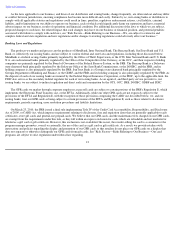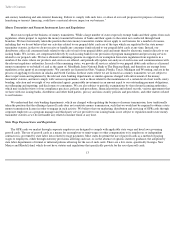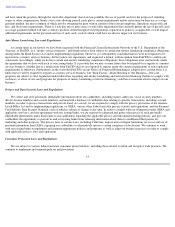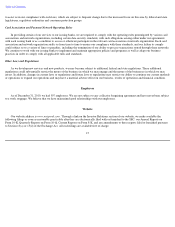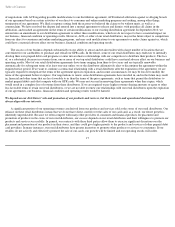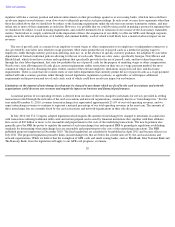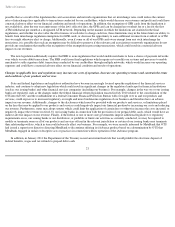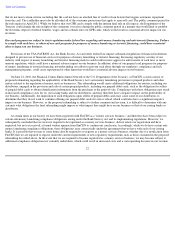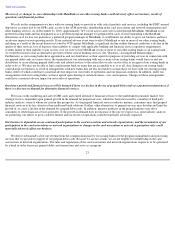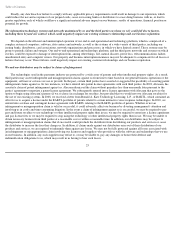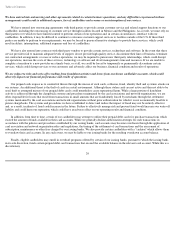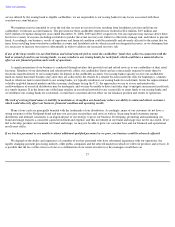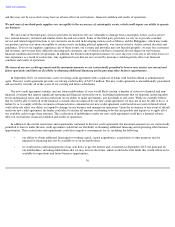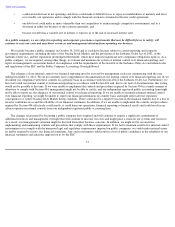NetSpend 2010 Annual Report Download - page 26
Download and view the complete annual report
Please find page 26 of the 2010 NetSpend annual report below. You can navigate through the pages in the report by either clicking on the pages listed below, or by using the keyword search tool below to find specific information within the annual report.
Table of Contents
that do not meet certain criteria, including that the card not have an attached line of credit or loan feature that triggers automatic repayment
from the card. The cardholder must also be afforded all of the consumer protections that apply to a payroll card. The public comment period for
the rule expires in April 2011. While we believe that our GPR cards comply with the interim final rule in all respects, the Department of the
Treasury could change the rule in light of the comments it receives during the public comment period in a manner that would limit or prohibit
the electronic deposit of federal benefits, wages and tax refunds onto our GPR cards, which would result in a material adverse impact on our
revenues.
Our card programs are subject to strict regulation under federal law regarding anti-money laundering and anti-terrorist financing. Failure
to comply with such laws, or abuse of our card programs for purposes of money laundering or terrorist financing, could have a material
adverse impact on our business.
Provisions of the USA PATRIOT Act, the Bank Secrecy Act and other federal law impose substantial regulation of financial institutions
designed to prevent use of financial services for purposes of money laundering or terrorist financing. Increasing regulatory scrutiny of our
industry with respect to money laundering and terrorist financing matters could result in more aggressive enforcement of such laws or more
onerous regulation, which could have a material adverse impact on our business. In addition, abuse of our prepaid card programs for purposes
of money laundering or terrorist financing, notwithstanding our efforts to prevent such abuse through our regulatory compliance and risk
management programs, could cause reputational or other harm that would have a material adverse impact on our business.
On June 21, 2010, the Financial Crimes Enforcement Network of the U.S. Department of the Treasury, or FinCEN, issued a notice of
proposed rulemaking regarding the applicability of the Bank Secrecy Act's anti-money laundering provisions to prepaid products and other
matters related to the regulation of money services businesses. This rulemaking would create additional obligations for entities, including our
distributors, engaged in the provision and sale of certain prepaid products, including our prepaid debit cards, such as the obligation for sellers
of prepaid debit cards to obtain identification information from the purchaser at the point-of-
sale. Compliance with these obligations may result
in increased compliance costs for us, our issuing banks and our distributors, and may therefore have a negative impact on the profitability of
our business. Additionally, the imposition of such obligations upon sellers of prepaid debit cards may cause some of our distributors to
determine that they do not wish to continue offering our prepaid debit cards for sale or reload, which could also have a significant negative
impact on our business. However, as the proposed rulemaking is subject to further comment and revision, it is difficult to determine with any
certainty what obligations the final rulemaking might impose or what impact they might have on our business or that of our issuing banks or
distributors.
At certain times in our history we have been registered with FinCEN as a "money services business," and therefore have been subject to
certain anti-money laundering compliance obligations arising under the Bank Secrecy Act and its implementing regulations. However, we
subsequently concluded that we were not required to be registered as a money services business, did not renew our registration and have
requested, but not yet received, a formal written opinion from FinCEN to confirm our conclusion. Accordingly, while we do have certain anti-
money laundering compliance obligations, these obligations arise contractually under the agreements that we have with each of our issuing
banks. It is possible that we may at some future date be required to re-register as a money services business, whether due to a notification from
FinCEN that we are required to register under the current requirements or new regulatory requirements such as those contained in the proposed
rulemaking described above. In the event that we are required to become registered as a money services business, we may become subject to
additional compliance obligations not currently undertaken, which could result in increased costs and a corresponding decrease in our revenue.
22


